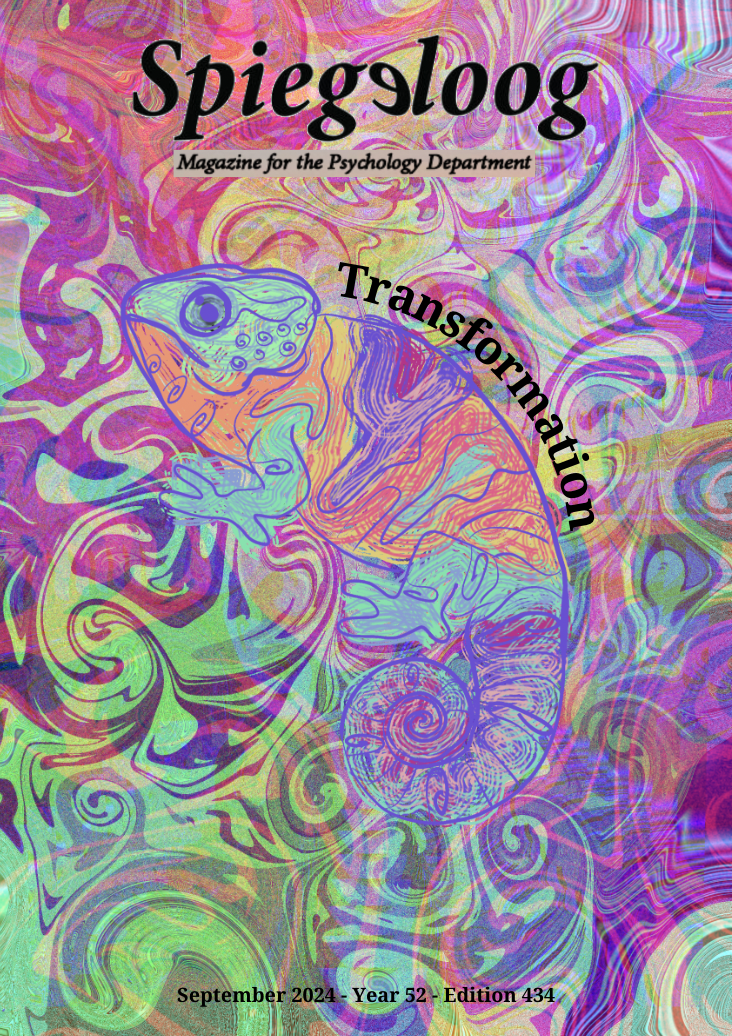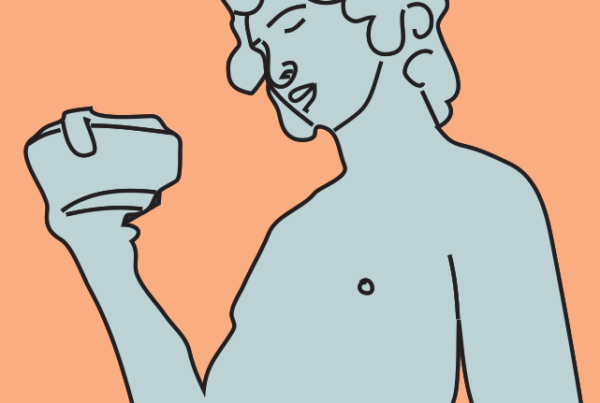
Dear readers,
With the weather getting colder, shorts being tucked away for the sake of sweaters, and students transitioning from beers on the beach to coffee in lecture halls, the ever-present change that is baked into our lives is more evident than ever. We invite you to read Spiegeloog 434: Transformation, the perfectly titled first issue of this academic year and our new editorial board.
This issue has also been the last one involving preparation by the ’22-’24 Editors-in-Chief, Anushka and Evita, and while bittersweet, we are proud and excited to introduce you to the new Spiegeloog Editors-in-Chief, Shriya Bang and Jules Kotowicz.

Cover by Anushka Sabhanam
We kick things off with Laura’s Office Hours piece, which provides a glimpse into the life of Bertjan Doosje, whose rich personal and academic memorabilia reflect his journey and passions in radicalisation studies. Next, Nicole journeys into the world of psychedelics with an intimate interview exploring the profound insights of psilocybin truffles, which foster self-awareness, emotional clarity, and personal growth, offering more than just altered perception—a pathway to deep inner transformation. In his piece, Barnaba discusses how AI has quietly slipped into our lives, transforming our reality in unexpected ways while we have been too blinded by sci-fi fears to face the truth of this ‘passive AI revolution’. For Corridor, Vadim reflects on the keen personal and academic transformations experienced by UvA Psychology graduates, delving into how their university journey reshaped their perspectives and future paths. Next, Shriya K. probes the unique pressures faced by Gen Z in a world overwhelmed by technology, climate crises, and hustle culture, and explores how they’re turning to nostalgia and mental health awareness as coping mechanisms. Then, Zhen navigates the moral consequences and human cost of AI, and how automated decisions bear grave real-world consequences — raising concerns about fairness, bias, and the dangers of unchecked AI deployment. For the Camera Obscura column, Hanna takes a step inside ‘Hotel Mokum,’ a powerful docu-fiction that merges activism and art in a captivating narrative of squatting, community, and defiance against Amsterdam’s housing crisis. Shriya B. delves into the fascinating world of hyperthymesia, or ‘perfect memory’. Through real-life cases and literary reflections, she unveils how forgetting may be a blessing rather than a burden. In their Tabula Rasa, Barnaba and Nicole take a look at Flowers for Algernon, exploring the emotional toll of intellect, as a journey from mental disability to genius leaves protagonist Charlie grappling with isolation. To close off the issue, Katie writes a Bacchus on how transitioning from academia to action can be both daunting and transformative, and examines the challenges (and possibilities) of making a meaningful impact using knowledge.
We hope you enjoy this issue!
Shriya & Jules
Dear readers,
With the weather getting colder, shorts being tucked away for the sake of sweaters, and students transitioning from beers on the beach to coffee in lecture halls, the ever-present change that is baked into our lives is more evident than ever. We invite you to read Spiegeloog 434: Transformation, the perfectly titled first issue of this academic year and our new editorial board.
This issue has also been the last one involving preparation by the ’22-’24 Editors-in-Chief, Anushka and Evita, and while bittersweet, we are proud and excited to introduce you to the new Spiegeloog Editors-in-Chief, Shriya Bang and Jules Kotowicz.

Cover by Anushka Sabhanam
We kick things off with Laura’s Office Hours piece, which provides a glimpse into the life of Bertjan Doosje, whose rich personal and academic memorabilia reflect his journey and passions in radicalisation studies. Next, Nicole journeys into the world of psychedelics with an intimate interview exploring the profound insights of psilocybin truffles, which foster self-awareness, emotional clarity, and personal growth, offering more than just altered perception—a pathway to deep inner transformation. In his piece, Barnaba discusses how AI has quietly slipped into our lives, transforming our reality in unexpected ways while we have been too blinded by sci-fi fears to face the truth of this ‘passive AI revolution’. For Corridor, Vadim reflects on the keen personal and academic transformations experienced by UvA Psychology graduates, delving into how their university journey reshaped their perspectives and future paths. Next, Shriya K. probes the unique pressures faced by Gen Z in a world overwhelmed by technology, climate crises, and hustle culture, and explores how they’re turning to nostalgia and mental health awareness as coping mechanisms. Then, Zhen navigates the moral consequences and human cost of AI, and how automated decisions bear grave real-world consequences — raising concerns about fairness, bias, and the dangers of unchecked AI deployment. For the Camera Obscura column, Hanna takes a step inside ‘Hotel Mokum,’ a powerful docu-fiction that merges activism and art in a captivating narrative of squatting, community, and defiance against Amsterdam’s housing crisis. Shriya B. delves into the fascinating world of hyperthymesia, or ‘perfect memory’. Through real-life cases and literary reflections, she unveils how forgetting may be a blessing rather than a burden. In their Tabula Rasa, Barnaba and Nicole take a look at Flowers for Algernon, exploring the emotional toll of intellect, as a journey from mental disability to genius leaves protagonist Charlie grappling with isolation. To close off the issue, Katie writes a Bacchus on how transitioning from academia to action can be both daunting and transformative, and examines the challenges (and possibilities) of making a meaningful impact using knowledge.
We hope you enjoy this issue!
Shriya & Jules


